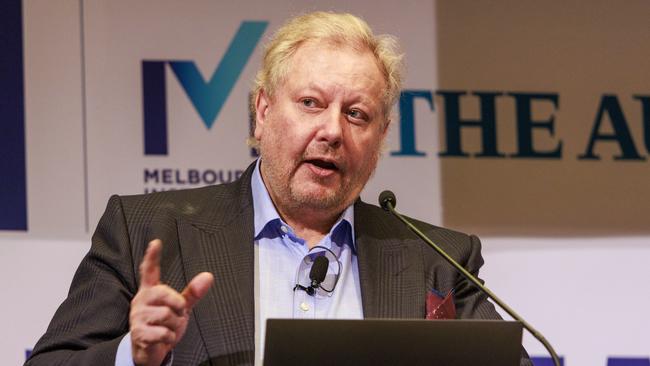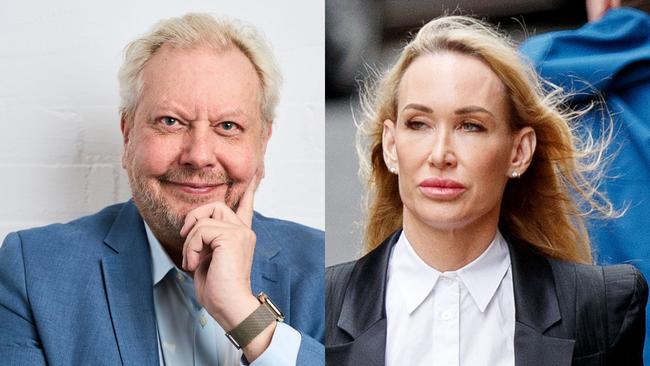WiseTech faces new legal claim as investors lodge class action over ‘misleading’ earnings guidance
As it reels from the resignation of its billionaire founder, WiseTech has been accused of ‘misleading and deceptive’ conduct over historic earnings forecasts.

WiseTech Global says it will “vigorously defend” an investor class action that claims the company engaged in “misleading and deceptive” conduct as it faces a fresh scandal following the resignation of its billionaire founder Richard White.
Law firm Phi Finney McDonald on Wednesday said it had started proceedings in the Supreme Court of Victoria, alleging the company breached its continuous disclosure obligations over its earnings guidance five years ago.
The logistics software giant has been embroiled in scandal after Mr White stepped down as a director and chief executive last month following allegations that he exchanged business advice for sex with several women.
He has since taken leave and will return to the company he founded 30 years ago in a new consulting role, with the title of founder and founding CEO, and will maintain his $1m a year salary.
Phi Finney McDonald alleges WiseTech’s fiscal 2020 guidance, which the company provided on August 21, 2019 and reaffirmed in October and November that year was done “without reasonable grounds”.
That guidance was revised down on February 19, 2020, sparking a 27 per cent plunge in its share price to $21.40. The following day it fell another 11.8 per cent to $18.80.
“Investors who acquired WiseTech shares during the claim period are entitled to compensation for loss and damage as they paid more for those shares than they ought to have paid as a consequence of WiseTech’s conduct,” Phi Finney McDonald claimed in a statement.
“The class action also alleges that some group members would not have purchased WiseTech shares if WiseTech had complied with its obligations.”

In a statement to the ASX, WiseTech said it was yet to be “served with any originating process in respect of the class action proceedings”.
“WiseTech Global intends to vigorously defend any such proceedings if they are served,” the company said.
Mr White founded WiseTech in 1994. Since it was listed on the ASX in 2016, its shares have soared more than 3200 per cent to $133.01, valuing the company at $44.49bn, making it one of Australia’s biggest tech success stories.
On Friday it closed down 1.3 per cent, at $130.51.
Mr White has also resigned from the Tech Council of Australia board after he was appointed a director of the industry lobby group in June, pipping AirTrunk founder and chief executive Robin Khuda.
The TCA has attracted criticism for not advocating a safe place for women over its handling of the allegations.
Sally-Ann Williams – a former Google executive who now heads one of the nation’s top tech incubators, Cicada Innovations – said many female entrepreneurs were fearful of taking private meetings with powerful men out of fear of being preyed upon, and described how the TCA managed the departure of Mr White – who initially stepped down from public duties – as a “missed opportunity”.
“I think it’s a missed opportunity to send a signal about where the sector can recognise its flaws and recognise its challenges,” she said. “We do have an inclusion challenge. I think it was an opportunity to show leadership about where the bar is,” Ms White said.

The TCA – which is holding its national tech summit in Melbourne this week – has defended its management of Mr White. When asked if the TCA could have handled it differently, chief executive Damian Kassabgi said he had nothing further to add than the group’s previous statement from chair Robyn Denholm about the issue.
“Robyn has put her statement out in relation to how the board managed the process. You’ve seen all of that … having the board member step down, you know, within 48 hours from public duties,” Mr Kassabgi said.
He added the TCA was taking diversity seriously, adopting new “T-EDI” standards which cover “10 markers, including hiring practices, parental leave policies, pay transparency and flexible work”.
“Our board has been working very hard on that,” Mr Kassabgi said.
“There is no doubt there is an opportunity here for us to dig in, to not be so insular, to think about how we can ensure that there is proper diversity in the sector. And that’s exactly what we’re working on.”

Mr White, who is worth about$15bn, tried to bankrupt the woman, after – she alleged – he offered her business advice and a $13m mansion in Sydney’s Vaucluse in exchange for sex.
Ms Rogan purchased $90,000 worth of luxury furniture for the property, but claimed it was useless after she was locked out of the mansion when Mr White’s now wife Zena Nasser discovered the pair’s affair.
Ms Rogan successfully applied for garnishee orders to get the $90,000 from Mr White’s bank account, but he filed bankruptcy proceedings against her to get the money back.
Mr White and Ms Rogan settled their federal court dispute last month, but the legal fight sparked other allegations.
Another woman, psychologist Jenna Riches, came forward, telling The Australian Mr White had also allegedly offered her business advice in exchange for sex. The Australian also revealed Mr White purchased a property in Lane Cove in 2018 for businesswoman Marcia Kensell, before their sexual relationship also fell through.



